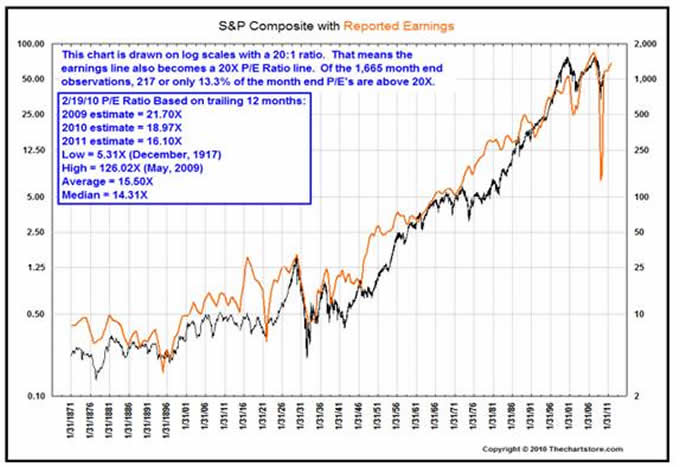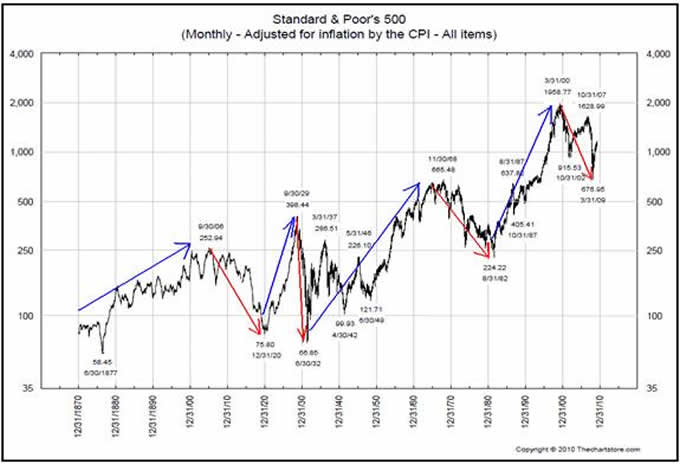Financial Markets are Driven by Two Powerful Emotions, Greed and Fear
Stock-Markets / Stock Market Sentiment Mar 05, 2010 - 03:47 AM GMTBy: Puru_Saxena
 A Weighing Machine - “In the short run, the market is a voting machine, but in the long run it is a weighing machine’ – Benjamin Graham
A Weighing Machine - “In the short run, the market is a voting machine, but in the long run it is a weighing machine’ – Benjamin Graham
BIG PICTURE – The truth is that the financial markets are driven by two powerful emotions – greed and fear. Essentially, during periods when the market participants are feeling cheerful and optimistic, they end up paying exorbitant prices for mediocre businesses. On other occasions, when investors are feeling pessimistic about the near-term economic prospects, they price wonderful businesses at absurdly low valuations. This manic-depressive behaviour has been consistent since the beginning of time and is largely responsible for the wild short-term gyrations in the financial markets.
Look. Over the short-term, stock prices are determined by the rapidly-changing emotions of the market participants which fluctuate depending on the news flow. However, over the long-term, the fate of every stock is ultimately determined by the operating results of the underlying business. Figure 1 highlights the close relationship between corporate earnings in America (orange line) and the S&P 500 Index (black line). As you can see, over the past 140 years, the return from American stocks has almost mirrored the growth in corporate earnings.
Figure 1: Long-term returns depend on earnings

Source: The ChartStore
During times of high volatility and great economic uncertainty, it pays to remember that stocks represent partial stakes in operating businesses. Therefore, as long as the businesses you own are producing satisfactory results, it is best to ignore the market’s temporary appraisal of your holdings.
It is worth noting that during secular bull-markets, stocks outperform bonds and cash. Conversely, during secular bear-markets, they produce disappointing returns. Fortunately, secular bear-markets do not happen very often and they are always followed by lengthy and powerful bull-markets.
In Figure 2, we have highlighted four secular bear-markets and four secular bull-markets which have occurred in the US over the past 140 years. Now, it is interesting to note that with the exception of the 1929-1932 market crash (which coincided with the Great Depression), during all the other secular bear-markets, the S&P 500 Index lost roughly two-thirds of its value in real terms! Even the most recent secular bear-market (2000-2009) produced an inflation-adjusted loss of 66%, which is remarkably consistent with the carnage of the previous episodes. Therefore, in terms of magnitude, the most recent secular bear-market was almost identical to two of the three previous secular bear-markets. The only exception was the deflationary Great Depression which caused the S&P 500 Index to plummet by an astonishing 83% in real terms!
Figure 2: S&P 500 (adjusted for inflation) – 1870 to present

Source: The ChartStore
Given the fact that the most recent secular bear-market was similar in magnitude to most of the previous secular bear-markets, it is conceivable that it may have ended in March 2009. If this turns out to be true, investors are in for a real treat!
Now, before you dismiss our positive prognosis, you may want to note that every secular bear-market in the past was followed by a massive secular bull-market. In fact, the previous four secular bull-markets produced the following inflation-adjusted returns:
- 1877-1906 - (+) 433%
- 1920-1929 - (+) 530%
- 1932-1968 - (+) 1008%
- 1982-2000 - (+) 874%
So, if we are indeed in a new secular bull-market, stock portfolios are likely to produce spectacular inflation-adjusted returns over the following decades.
Even if our assessment is off the mark and the S&P 500 Index drops below the March 2009 low in inflation-adjusted terms, we doubt if it will make a new nominal low. In our view, the central banks’ ability to create even more money will prevent the S&P 500 Index from falling below the 666 level recorded in March 2009.
The reality is that we live in an era whereby currency debasement is a certainty. Whether you like it or not, under the current monetary system, inflation is unavoidable. And in a perverse manner, money creation increases nominal corporate earnings; thereby assisting stock prices over the medium to long-term.
Thanks to the consequences of monetary inflation, prices rise over time and this phenomenon gives a boost to the future cash flows of companies. So, even if a company does not succeed in increasing sales and profits through an improvement in its business, with the passage if time, its nominal earnings gets supercharged due to the inflation tonic.
Now, bearing in mind that stocks in the US have already lost two-thirds of their real value over the past decade and the fact that money-printers are running the economic world, it seems likely that stocks will continue to appreciate over the following years. Furthermore, if our assessment is correct, stock markets in the fast-growing developing nations will continue to outperform the ‘developed’ world.
After reviewing the macro-economic data, we are convinced that Asia will provide economic leadership and nations such as China, India and Vietnam will climb the prosperity ladder over the following years. Accordingly, we are holding on to our long-term investment positions in these countries and it is our conjecture that our companies will produce solid growth over the following years.
Puru Saxena publishes Money Matters, a monthly economic report, which highlights extraordinary investment opportunities in all major markets. In addition to the monthly report, subscribers also receive “Weekly Updates” covering the recent market action. Money Matters is available by subscription from www.purusaxena.com.
Puru Saxena
Website – www.purusaxena.com
Puru Saxena is the founder of Puru Saxena Wealth Management, his Hong Kong based firm which manages investment portfolios for individuals and corporate clients. He is a highly showcased investment manager and a regular guest on CNN, BBC World, CNBC, Bloomberg, NDTV and various radio programs.
Copyright © 2005-2010 Puru Saxena Limited. All rights reserved.
© 2005-2022 http://www.MarketOracle.co.uk - The Market Oracle is a FREE Daily Financial Markets Analysis & Forecasting online publication.
Comments
|
Albertarocks
11 Mar 10, 00:36 |
It's Not Fear and Greed
Markets are not driven by fear and greed. They're driven by Goldman Sacks America and JPM. |



